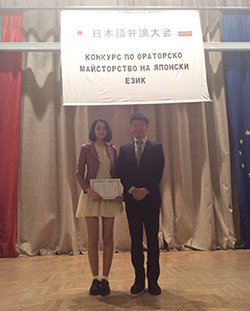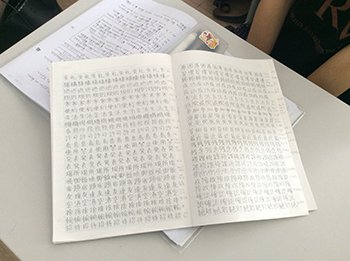2018 Japanese-Language Assistants’ Report: Hardworking Bulgarian Students
Sofia University
NODO Tomoki
Sofia University, where I am dispatched, is located in Sofia, the capital of the Republic of Bulgaria in Eastern Europe. Japanese-language classes began here in 1968 as an evening course open to the public, and Japanese-Language Specialists have been dispatched here since 1981. In 2001, the current Japanese Studies Course, Department of East Asian Languages and Cultures, was established, and Japanese-Language Assistants (hereafter referred to as "Assistants") have been dispatched here since 2008.
An Assistant has various duties, but my main responsibility is to teach and manage the first-year Japanese language beginner class. There are seven, 90-minute Japanese classes per week for first-year students, and although the composition changes depending on the semester, between three and six teachers, including myself, are in charge of the classes. The number of registered first-year students is about 25. Students in the Japanese Studies Course have a high level of proficiency in language acquisition, and before joining the course have already mastered Bulgarian, English, and a second language such as French or German. They appear to have the groundwork to be able to absorb other languages and cultures. In addition, many students are proactive and hard-working, and actively ask questions and speak up in class. The Japan Cultural Festival, held in May at the end of each academic year, is run by students on their own initiative, and features a variety of Japanese cultural workshops and performances that take a long time to prepare and practice. As for the management of the year level that I am in charge of, the materials related to that have been handed down from my predecessor, so, in discussion with the teachers in charge of the same year level, I used those materials as the basis for creating the schedule and syllabus.
In addition to daily classes, I also have duties related to off-campus events. In Sofia, the Japanese Speech Contest is held once a year. Coaching for students who participate in the contest is provided outside of class. Three students from Sofia University participated in the 2018 speech contest. From the preparation of each student's manuscript to practice of their speeches, we met for over a month outside of class on weekdays and, at the request of the students, even met on a holiday just before the contest to prepare for the day of the presentation. One of the participants was a student from one of my classes. During free time in class, they practiced their presentations with their classmates as the audience, and on the day of the contest, their classmates went along to support them. One student made rice balls for everyone and brought them along. Not only the presenters, but their classmates too, were fired up for the occasion. All the participants did very well on the day and some of our students won prizes, and the other teachers who coached students also said they were pleased with the results. I had been working on building a strong sense of fellowship among students in my daily classes, so it was a great experience for me to see how the class came together at this speech contest.

With a student who participated in the Japanese Speech Contest
The dispatch of Assistants will end when I leave, so there are several things that I have been working on ahead of my departure, and one of them is creating an environment for autonomous learning by students. After the dispatch of the Assistants to Sofia University ends, the local faculty members will be responsible for the work that the Assistants used to do, and there is concern that they will be overburdened with various tasks and jobs other than teaching. As a result, there is a risk that care for students may become inadequate, so I thought that students themselves need an environment and habits that allow them to study autonomously. Of course, as university students, they do their homework and assignments individually, but if students can teach and support each other when they stumble or lose motivation in their studies, the quality among students will improve as a synergistic effect, which will reduce the burden on teachers and improve the quality of instruction. Therefore, after discussion with the other teachers in charge of the same year level, we used a classroom outside of class time to create autonomous learning time that students are free to choose to participate in. Unlike daily lessons, I didn't speak there, but instead the students would decide what they wanted to study and work on it, ask each other questions about what they didn't understand, and then come to us with questions if they still couldn't solve their problems. In addition, as Japanese exchange students from Japanese universities come to Sofia University every year, we asked them to participate in the program, too. They study Bulgarian and English, but we created an environment where they could work autonomously in a group and everyone could teach each other. Then some students started doing activities and other things that I do in my classes. In addition, when we took a survey of the students, we found that some of them wanted to have conversation practice and do activities using Japanese, so we presented them with ideas and created opportunities for them to do those activities. As the end of the academic year approached, I told the students why I had created this autonomous learning time, and that I was not sure if the teacher would be able to create this time for the students in their second year. When we surveyed students about what they want to do in the future, some said that they want to continue the autonomous learning time as a student-based initiative. Of course, some of them may have just said that to please me, but I am going to work on this during my remaining dispatch period to ensure that this awareness is sustained and that this environment is passed on to new first-year students in the next academic year as well.

Students' Kanji notebooks
Thank you for reading.
- What We Do Top
- Arts and Cultural Exchange [Culture]
- Japanese-Language Education Overseas [Language]
- Japanese-Language Education Overseas [Language] Top
- Learn Japanese-language
- Teach Japanese-language
- Take Japanese-Language Test
- Know about Japanese-language education abroad
- The Japanese-Language Institute, Urawa
- The Japanese-Language Institute, Kansai
- Japanese-Language Programs for Foreign Specified Skilled Worker Candidates
- Japanese Language Education for Japanese Children Resident Overseas and for the Descendants of Migrants
- Archives
- Japanese Studies and Global Partnerships [Dialogue]
- JF digital collection
- Other Programs / Programs to Commemorate Exchange Year
- Awards and Prizes
- Publications
